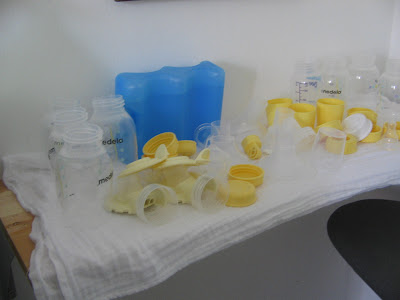Today is the third day of Ramadhan. Well, for me, yesterday was the worst day ever. I missed my sahur and no doubt I was feeling dizzy by 1100 am, lethargy by 1200 pm and Dinky Boo 2 was kicking like he@# inside of me. Story short, I broke my fast at 200 pm. No doubt that fasting during you are pregnant is way different than your average self. For today's sahur, I took a plate of rice, 1 glass of full cream milk (can't stand to drink Anmum!), try to drink glucose water but the taste was YUCKY! and drank a lot of water whick made me couldn't move for 5 minutes due to overload! Hahaha! There are lot of few things to consider when you are pregnant and fasting. As for me:
- Send Dinky Aeisyah to nursery so that I can rest a lot eventhough it is already school holiday! (kes mengada nih!)
- Do my cooking after Zuhur prayer.
- Do my sahur cooking before goes to sleep. Before this, I cooked in the wee hour of 430 am.
- Get over the fact that I can buy some kuih muih instead of cooking it.
Well, the routine will last only till tomorrow. This Wednesday, three of us will be at KL for 4 days straight. Then the school opens as usual. I will be having extra classes for Year 6 students and this make me thing, how will I survive it...? My current plan is...
- Sahur 500 am
- Go to school 730 am
- School ends 135 pm
- Extra class starts 230 pm
- Extra class ends 400 pm
- Go to Bazar Ramadhan 420 pm (which is conveniently located in front of Dinky Aeisyah's nursery!)
- Pick up Dinky Aeisyah 445 pm
- Arrive home 500pm
- Mr Vediaz gets home 615 pm
- Break the fast 720 pm
If you want to know more about fasting in pregnancy, MommyLyna wrote a post about it. Do check it out.
Below are some articles that I have taken from BabyCenter Malaysia.
Fasting in pregnancy
Is it safe?
There are not many medical studies looking at the effects of fasting, but fasting appears to be generally safe in pregnancy.
Here’s what we do know:
- Several studies looked at birth weights. They found no difference between the babies of mothers who fasted, and the babies of mothers who did not fast.
- Some studies have looked at the baby’s IQ and found no differences.
- Some studies took blood samples from fasting mothers and found that changes did occur. But the changes did not appear to harm the mothers or their babies. The studies compared the babies' birth weights and found no difference.
Women whose weight and lifestyle are generally healthy seem to cope well with fasting. And it may depend on several factors, such as:
- What stage you are in your pregnancy – in general fasting in pregnancy is best tolerated by mothers in the second trimester. Mine is already third trimester!
- Your general health before pregnancy and presence of any problems during the pregnancy.
Many – and probably the majority – of pregnant Muslim women choose to fast in Ramadan. Some surveys suggest up to 70 per cent of women will choose to fast. Particularly if you are in the second trimester of pregnancy when most mothers feel much better generally compared to the first and third trimesters, and you are healthy, you may certainly fast in Ramadan.
Nevertheless, Islam allows pregnant mothers not to fast if there are any concerns of effects of fasting on the individual mother or baby, provided the mother replaces the fast later, after the pregnancy is over. Those with diabetes in pregnancy may want to discuss it with their doctors first. Talk to your family, your doctor and a trusted religious authority to help you consider your options.
Is there anything I should do before fasting?
Plan ahead to make things easier during Ramadan. YUPP!
• Talk to your employer about managing your work during Ramadan. Some companies have their operational or working hours reduced during this time. (Extra class, oh extra class...)
• Start preparing early by doing shopping and errands before the fast.
What's the best way to break the fast?
Be sure to have a variety of healthy food and plenty to drink when you break your fast and at sahur.
- Choose foods that release energy slowly - such as dates, beans and lentils – to break the fast.
- Avoid sugary foods that will raise your blood sugar levels quickly – it will also drop quickly, and this can make you feel faint and dizzy.
- Make sure you get plenty of protein from beans, nuts and well-cooked meat and eggs. Protein is needed to help your baby grow well.
- Drink plenty of fluids overnight. You can become dehydrated especially when Ramadan falls in very hot weather.
Are there warning signs I should know about?
Contact your doctor if:
- You feel dizzy faint, weak or tired. Rest for half an hour to see if you feel better. If there is no change, talk to your doctor.
- You become nauseous or start vomiting.
- There is a noticeable change in your baby's movement. If you feel that your baby is not moving around or kicking much, it is very important to talk with your doctor.
- You become very thirsty or your urine becomes dark-coloured and strong-smelling. This is a sign of dehydration.
- You notice contraction-like pains. This could be a sign of premature labour and you should talk to your doctor straight away.
- You are not putting on weight, or are losing weight.
- You develop a headache or other pains, or a fever.
How can I make fasting in pregnancy easier?
- Plan your days so that you can take regular rests.
- Avoid walking long distances and carrying anything heavy.
- Keep cool – you can become dehydrated quickly and that's not good for you or your baby.
- Ask the other women in your family for tips and suggestions about how to cope while you are pregnant.
- Eat and drink wisely when you break your fast.
Generally, just take things easy and accept help when it is offered. Although the rest of your family and friends may stay up late, you may need to mark this Ramadan with more quiet, restful time.
Tips for a healthy fast
How can I make fasting easier?
If you fast, you will not be eating small meals every few hours, but you can still eat more than only two meals after breaking fast until sahur.
Having well-balanced, nutritious meals will help maintain your weight and prevent constipation, headache, indigestion , lethargy and heartburn – symptoms that are common during this period.
Is there any ideal way for pregnant women to break their fast?
There is no ideal meal plan that you should follow strictly, but try these tips on the best ways to break your fast.
- Break your fast with three dates and juice, low-fat milk or yoghurt, followed by soup, preferably clear-based.
- Dates and juices are good foods to bring low blood sugar levels back to normal.
Then eat a well-balanced meal that may include:
- a plate of salad or ulam as a starter;
- protein from chicken, meat or fish, or lentils, chickpeas or beans;
- complex carbohydrates from brown rice and wholewheat bread;
- and, a large amount of vegetables.
Do not forget to avoid high-fat meals to prevent weight gain, filling up on poor nutrients and indigestion.
Do I have to eat a sahur meal?
The sahur meal is one of the most important meals to consume during Ramadan to keep your energy levels up during the day. Do not skip this meal as it will provide you with important nutrients and the energy you need to get through the day. It will also decrease hunger symptoms, such as headache and sleepiness.
Your healthy sahur meal could include:
- brown rice and wholewheat bread with kurma or a light curry;
- bran or high-fibre cereal with low-fat or skimmed milk;
- and, fruit, including dates and bananas.
Avoid too much tea at this time, which can make you dehydrated.
I love drinking coffee and/or tea after buka puasa; how can I substitute them?
Drink fresh fruit juices instead of fizzy drinks or coffee and tea. A fruit smoothie made with some milk, yoghurt, ice and fruit makes a refreshing drink and gives you plenty of your daily fruit allowance (Yayyy! Reason to buy smoothies!). A vegetable soup will give you several different vegetables, which will add vitamins, minerals and fibre to your diet.
What should I include and avoid in my diet during Ramadan?
To follow a healthy fast, keep in mind the above tips when eating and:
- After dinner, relax for a while and then get up and move around. Participate in some light activity.
- Avoid snacking late in the evening before sleeping, but be sure to take your sahur meal.
- Drink plenty of water after buka puasa and before sahur to prevent dehydration.


 This is the motor. So small and light. Not that berkenan with the hands-free option tapi ok lah. The sound quite loud but I can live with that. The suction is gentler than PISA and my pumping output is quite the same with PISA.
This is the motor. So small and light. Not that berkenan with the hands-free option tapi ok lah. The sound quite loud but I can live with that. The suction is gentler than PISA and my pumping output is quite the same with PISA. All parts that had been wash and air dried. Inilah kerja makcik sepanjang cuti sekolah. Wash, pump, store, wash again...Bab membasuh ni yang haru sangat. If only I have a dishwasher!
All parts that had been wash and air dried. Inilah kerja makcik sepanjang cuti sekolah. Wash, pump, store, wash again...Bab membasuh ni yang haru sangat. If only I have a dishwasher!









































